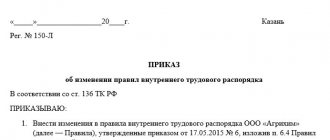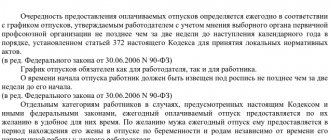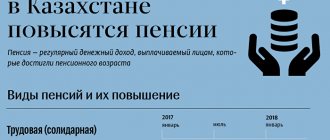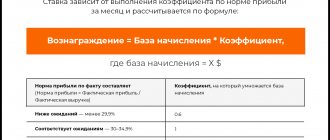Art. 121 Labor Code of the Russian Federation: questions and answers
Art. 121 of the Labor Code of the Russian Federation specifies the parameters of work experience to assess the possibility of obtaining the right to annual leave. We will tell you in our article which periods can be included in it and which need to be subtracted.
What does the article say? 121 Labor Code of the Russian Federation?
What are the time periods according to Art. 121 of the Labor Code of the Russian Federation is it allowed to include in vacation experience?
Article 121 of the Labor Code of the Russian Federation: what time is not included in the vacation period?
How do suspensions affect vacation time?
How Art. 121 of the Labor Code of the Russian Federation prescribes determining the vacation period for harmful workers?
https://youtu.be/NwcwN6WKWBY
Maternity leave
The full amount of maternity leave is counted in the vacation record. It can take up to 3 years.
But the rule only applies to birth. The next three years will allow you to maintain certain privileges:
- Part-time, performing duties at home.
- Possibility to return to your place at any time.
- Job preservation.
The payment of vacation pay for this period is not considered the direct responsibilities of the employer, according to current standards.
What does the article say? 121 Labor Code of the Russian Federation?
Article 121 of the Labor Code of the Russian Federation specifies the specifics of calculating the length of service that gives the right to annual paid rest. Why does the legislator pay such attention to this issue that he allocated a separate article for it in the code?
This is due to the fact that providing annual paid leave (APV) is one of the employer’s responsibilities. But for the employee it’s a pleasant right. At the same time, both parties to the employment contract strive to take into account their interests, which can lead to the following abuses:
- on the part of the employer - to incorrect calculation of the period of work of the employee giving the right to leave (in order to delay the moment of his legal rest);
- on the part of the employee - to an urgent need for “paid” rest, when the right to legal leave has not yet been earned.
To avoid disagreements and conflicts, the legislator deciphered line by line in Art. 121 of the Labor Code of the Russian Federation, all time intervals that make up the employee’s length of service, giving him the right to legally go on annual leave. He also separately prescribed the periods of time that must be removed from this experience.
The main purpose of Art. 121 of the Labor Code of the Russian Federation - eliminate discrepancies in determining the length of leave. The importance of correctly determining its duration becomes obvious after studying Art. 122 of the Labor Code of the Russian Federation, which describes the procedure for providing an SOO.
This article establishes 2 approaches to the emergence of the right to an SOO:
- no earlier than 6 months of continuous work in this company (right to first vacation);
- annually according to the vacation schedule (for the 2nd and subsequent years of work).
In both cases, the correct calculation of the vacation period is of great importance.
“Vacation schedule - form and sample for filling out in 2020” will help you understand the intricacies of the vacation schedule .
Prerequisites
In Part 1 of Art. 121 of the Labor Code of the Russian Federation strictly regulates what exactly is considered length of service for vacation. In addition to the time devoted directly to the performance of official duties, it includes periods when a person was removed from work due to illegal actions against him. For example, an employee was fired for a specific reason specified in the order. And the man managed to prove the illegality of the administration’s decision. The court ordered his reinstatement. The period while he was forced to skip work is included in the length of service. You should remember this and actively express your position. Believe me, the boss is not always right. Another article 121 of the Labor Code of the Russian Federation obliges to take into account those days when a person was not actually engaged in work, but his place was retained. For example, holidays. After all, most organizations do not work on such days. However, they are not discarded when calculating length of service. They enter it. The same should be said about the vacation period. They are also included in the seniority. This refers to paid days off. They are counted together with the labor period. The same applies to absence from service due to illness, participation in military training, or undergoing a medical examination. Legislation gives the right to establish other norms by corresponding internal document or collective agreement.
What are the time periods according to Art. 121 of the Labor Code of the Russian Federation is it allowed to include in vacation experience?
The list of periods included in the vacation period consists of 5 points:
- hours worked;
- periods when the employee was not at work, but his job was retained (vacation, holidays and other similar days of rest);
- time of absenteeism through no fault of the employee (in case of illegal dismissal or suspension from work);
- temporary periods during which the employee did not work (was suspended from work) due to the lack of results of a mandatory medical examination (if this is not the employee’s fault);
- employee rest days provided to him without payment at his request (from 1 to 14 days per working year).
Despite the fact that 4 out of 5 points are periods when the employee did not perform work duties, the time of such rest is counted in the length of service that gives the right to SOO.
How to correctly calculate vacation pay if the billing period has not been fully worked out, read the articles on our website:
- “How to calculate vacation if it falls on holidays?”;
- “Leave without pay according to the Labor Code of the Russian Federation (nuances)”.
Which periods to exclude?
Time-exclusion from seniority is described in Article 121 of the Labor Code. The following periods are described:
- The citizen's guilt has been proven that he was not there. An example is disrupted labor order and discipline, alcohol and drug intoxication.
- Leave periods for children until they are 1.5 and 3 years old.
- No serious reasons for absenteeism at work.
- Vacation when the salary was not saved. Including for 14-day and longer rest periods.
Such periods of time contribute to increasing the overall working year.
Article 121 of the Labor Code of the Russian Federation: what time is not included in the vacation period?
Art. 121 of the Labor Code of the Russian Federation provides for the following intervals that must be excluded from the total time giving the right to SOO:
- periods when the employee was absent from the workplace without sufficient compelling reasons, including when suspended from work in situations provided for in Art. 76 of the Labor Code of the Russian Federation (details are discussed in the next section);
- time spent on “children’s” leave (to care for a child up to the age established by law);
- vacation at your own expense for more than 14 days a year.
The legislation does not contain a list of valid reasons for absence from work. Justified reasons for absence from work include:
- sudden deterioration in health (if there is a confirmatory certificate from a doctor);
- weather conditions that prevented you from arriving at work on time (ice, fog, etc.);
- administrative arrest;
- the need to care for a sick child or other family member:
- lack of tickets at the box office (inability to return from vacation on time);
- a broken bus (or other type of public transport) that prevented you from arriving at work on time;
- other reasons for absence.
In any case, the employee must inform the employer in a way accessible to him (by telephone, Internet, telegram, etc.) about the impossibility of being present at the workplace. In addition, the reason for absence from work must be documented. This will help prove that there was no absenteeism and there is no reason for dismissal.
Read about the relationship between maternity leave and length of service in the article “Is maternity leave included in length of service (nuances)?” .
Unaccounted periods
Art. 121 of the Labor Code of the Russian Federation describes not only those periods that should be included in the vacation period, but also those that are excluded from it.
The following time periods are not taken into account:
- Days taken without pay if they exceed the limits specified in Article 128 of the Labor Code of the Russian Federation.
- Absence from work without good reason.
- Removal from work for reasons of violation of legal norms.
- Being on parental leave for up to three years.
Please note that the first and last paragraphs unconditionally retain the employee’s job for the entire period of absence, but are not included in the length of service. But the second and third paragraphs not only exclude the specified day from the total period affecting the vacation period, but also entail penalties, fines and even dismissal.
Absence from work without good reason
If an employee has not agreed upon his absence in advance with management, and also has not received written permission for it, then failure to appear at the workplace is considered disrespectful, even if the absentee himself has good reasons for such behavior. Such days are automatically counted as absenteeism and, of course, are excluded from the total length of service.
In addition, the employer himself may temporarily remove a person from performing his job duties, if such a measure is justified. The reasons why an employer can remove an employee from work are listed in Article 76 of the Labor Code.
An employee receives permission to perform his job duties only after the reason for which he was suspended has completely exhausted itself.
Maternity leave
The time spent caring for a child in the period from the moment of his birth until he turns three years old is considered socially protected. During these years, the state takes upon itself the maintenance of the parent, caregiver and baby. A benefit is transferred to the parent monthly. Its size directly depends on the citizen’s income level before going on maternity leave.
During the entire period of departure, the employer does not have the right to dismiss the employee; moreover, he must retain his place of work. After three years or earlier, at any other time, the employee may return to partially or fully perform his job duties. Work experience, which allows you to count on vacation days and compensation, will begin from the moment you actually start working. But the time spent at home with the baby will not allow you to count on receiving a paid mandatory day of rest, since the worker is already exempt from work.
How do suspensions affect vacation time?
One of the components of the vacation period is the time of suspension from work (Article 76 of the Labor Code of the Russian Federation). In this case, it is important that the employee is guilty of forced downtime.
Periods that are not taken into account in the vacation record include the time an employee is removed from work for the following reasons:
- the employee showed up to work in a state of intoxication;
- through his own fault, he did not undergo training and (or) knowledge testing on labor protection;
- according to the conclusion of the medical commission, work in this position is prohibited;
- an employee who is a carrier of the infection can become a source of spread of the disease (due to the specifics of the work he performs);
- the employee’s special rights have expired or special permits (licenses, driver’s licenses, etc.) have been suspended when their presence is mandatory to perform the work;
- at the request of authorized bodies (labor inspectorate, prosecutor's office, court, etc.);
- for other justified reasons.
Downtime through no fault of the employee may include suspension from work:
- due to a failed medical examination (which is not the employee’s fault);
- lack of opportunity to undergo training and testing of knowledge on labor protection, if the employer has not organized a training and (or) testing process;
- illegal actions of the employer who did not allow the employee to perform work duties (use of grounds for removal not provided for in Article 76 of the Labor Code of the Russian Federation, failure to comply with the procedure for removal, unlawful use of removal as a disciplinary sanction, etc.).
You can familiarize yourself with the grounds that allow an employer not to allow an employee to work in the article “Removal from work under the Labor Code of the Russian Federation - procedure and grounds .
Working year, vacation period and pay period
Being in a position for less than 12 calendar months raises especially many questions. The reporting period will be the days on the calendar that preceded the rest.
In such circumstances, the following conditions are relied upon:
- There was no work, but the salary was kept in full or in parts. The laws of the Russian Federation allow cases of missing payment.
- Disability care associated with pay-saving days.
- Inability to go to work due to a strike in which the citizen was not a participant.
- Downtime occurred due to the fault of the employer or other reasons beyond the control of the parties.
- Periods in accordance with the laws of the Russian Federation while maintaining the average remuneration for labor. The exception is breaks related to feeding the child.
How Art. 121 of the Labor Code of the Russian Federation prescribes determining the vacation period for harmful workers?
If an employee works in special and (or) harmful conditions, he is entitled to a vacation supplement in the form of additional days of rest. In this case, a situation may arise when the employee worked part of the working time in normal conditions (without exposure to unfavorable factors), and part of the time in negative health conditions.
IMPORTANT! In Art. 121 of the Labor Code of the Russian Federation establishes the following rule: the length of service that gives the right to additional leave for work in harmful and (or) dangerous conditions can only include the time that the employee actually worked in such conditions.
Get acquainted with the features of providing additional leave using the materials on our website:
- “Additional leave for harmful working conditions – 2018”;
- “Additional leave for irregular working hours”.
You can find more complete information on the topic in ConsultantPlus. Full and free access to the system for 2 days.
Article 121. Calculation of length of service giving the right to annual paid leave
Determination of the Supreme Court of the Russian Federation dated February 22, 2002 N 83-В01-23 1 Similar provisions are contained in Art. 121 of the Labor Code of the Russian Federation, currently in force. Consequently, the court of first instance correctly recovered monetary compensation for unused vacation for the entire period of M.’s work in the military unit, since the periods during which the plaintiff did not actually fulfill his official duties in connection with illegal dismissals are, by virtue of the law, included in the length of service , giving the right to leave, including additional.
Determination of the Supreme Arbitration Court of the Russian Federation dated June 14, 2013 No. VAS-7622/13 in case No. A67-4468/2012
Having applied, when considering the dispute, the provisions of Articles 121, 234 of the Labor Code of the Russian Federation, paragraph 35 of the Rules for maintaining and storing work books, producing work record forms and providing them to employers, approved by Decree of the Government of the Russian Federation of April 16, 2003 N 225 “On work books”, paragraph 1 of Article 7 of the Federal Law of July 24, 2009 N 212-FZ, the courts recognized the specified payment as a payment in favor of the employee during forced absence, subject to inclusion in the object of taxation of insurance premiums when calculating the calculation base of insurance premiums. At the same time, the courts proceeded from the fact that payments in the amount of average earnings for the entire period of forced absence were not included in the list provided for in Article 9 of this Law.
Determination of the Constitutional Court of the Russian Federation dated February 25, 2016 N 231-O
1. In his complaint to the Constitutional Court of the Russian Federation, citizen A.G. Zlobin challenges the constitutionality of the provisions of Article 1 of the Federal Law of July 22, 2008 N 157-FZ “On Amendments to the Labor Code of the Russian Federation and Article 26.3 of the Federal Law “On the General Principles of the Organization of Legislative (Representative) and Executive Bodies of State Power of the Subjects of the Russian Federation”, according to which the first part of Article 121 of the Labor Code of the Russian Federation was set out in a new edition, according to which the length of service giving the right to annual basic paid leave includes the time of unpaid leave provided at the request of the employee, not exceeding 14 calendar days in during the working year.
Determination of the Constitutional Court of the Russian Federation dated May 29, 2019 N 1267-O
1. Citizen A.A. Fedorov disputes the constitutionality of part three of Article 121 of the Labor Code of the Russian Federation, according to which the length of service giving the right to annual additional paid leave for work under harmful and (or) dangerous working conditions includes only the time actually worked in the relevant conditions.
Appeal ruling of the Judicial Collegium for Administrative Cases of the Supreme Court of the Russian Federation dated September 11, 2019 N 60-APA19-2
The argument in the appeal of the government of the Kamchatka Territory about the groundless reference by the trial court to Article 121 of the Labor Code of the Russian Federation is not significant for the administrative case, since the court did not indicate the need to exclude any specific periods of work that are not included in the length of service that gives the right for annual basic paid leave, but only stated that the Regulations on the procedure for compensation do not regulate this issue.
Ruling of the Supreme Court of the Russian Federation dated April 20, 2018 N 309-ES18-3535 in case N A50-5617/2017
Taking into account the circumstances established in the case, guided by the provisions of Articles 114, 121, 135, 139, 165, 170 of the Labor Code of the Russian Federation, Articles 1, 5, 28 of the Federal Law of March 28, 1998 N 53-FZ “On Military Duty and Military Service” , Regulations on the preparation of citizens of the Russian Federation for military service, approved by Decree of the Government of the Russian Federation dated December 31, 1999 N 1441, Regulations on conscription of citizens of the Russian Federation for military service, approved by Decree of the Government of the Russian Federation dated November 11, 2006 N 663, Regulations on the specifics of the calculation procedure average salary, approved by Decree of the Government of the Russian Federation dated December 24, 2007 N 922, Regulations on military medical examination, approved by Decree of the Government of the Russian Federation dated July 4, 2013 N 565, Rules for compensation of expenses incurred by organizations and citizens of the Russian Federation in connection with the implementation of the Federal of the Law “On Military Duty and Military Service”, approved by Decree of the Government of the Russian Federation dated December 1, 2004 N 704, clarifications set out in paragraph 12 of the Resolution of the Plenum of the Supreme Court of the Russian Federation dated June 23, 2015 N 25 “On the application by courts of certain provisions of Section I Part 1 Civil Code of the Russian Federation" and paragraph 5 of the Information Letter of the Presidium of the Supreme Arbitration Court of the Russian Federation dated May 31, 2011 N 145 "Review of the practice of consideration by arbitration courts of cases on compensation for damage caused by state bodies, local governments, as well as their officials", appellate court The court proceeded from the fact that by transferring funds from the federal budget to the plaintiff as compensation only in connection with the payment of average earnings to employees and refusing to pay compensation for expenses incurred in connection with the payment of leave during the involvement of medical employees in the draft commission, the commissariat acted lawfully, which the district court agreed with.
Determination of the Constitutional Court of the Russian Federation dated May 25, 2017 N 932-O
1. In his complaint to the Constitutional Court of the Russian Federation, citizen V.M. Bogdanov disputes the constitutionality of part three of Article 121 of the Labor Code of the Russian Federation, according to which the length of service giving the right to annual additional paid leave for work under harmful and (or) dangerous working conditions includes only the time actually worked in the relevant conditions.
Determination of the Supreme Court of the Russian Federation dated May 16, 2002 N KAS02-200
The court reasonably proceeded from the fact that the Law (Article 117 of the Labor Code of the Russian Federation) does not indicate that the Government of the Russian Federation has established the grounds for providing additional leave to employees engaged in work with harmful and dangerous working conditions, regardless of the duration of work in hazardous working conditions, since one of the conditions for granting such leave is the time actually worked in the appropriate conditions (Article 121 of the Labor Code of the Russian Federation), that is, for the provision of such leave, the duration of the work shift and the hours actually worked by the employee are taken into account, and not the fact of working in harmful conditions, therefore the court reasonably recognized that for the right to additional leave with harmful working conditions to arise, work is associated with an irreparable adverse effect on human health of harmful physical, chemical, biological and other factors, the absence of which does not give the employee the right to be granted this leave.
Decision of the Supreme Court of the Russian Federation dated April 15, 2004 N GKPI2004-481
The length of service that gives the right to annual additional paid leave for work with harmful and (or) dangerous working conditions includes only the time actually worked in the relevant conditions (Part 3 of Article 121 of the Labor Code of the Russian Federation). Based on the foregoing, the court believes that the provisions of paragraph. 2 paragraph 8 of the Instructions do not contradict current legislation.
Ruling of the Supreme Court of the Russian Federation dated March 28, 2013 N APL13-102
According to the applicant, the findings of the trial court are not consistent with the provisions of Art. 10 of the Constitution of the Russian Federation, Art. , , , 117, 121, 147 of the Labor Code of the Russian Federation, resolution No. 870 of November 20, 2008 and infringe on the legitimate interests of workers, employers and the state as a whole.
Resolution of the Plenum of the Supreme Court of the Russian Federation dated November 24, 2015 N 52
According to part three of Article 348.4 of the Labor Code of the Russian Federation, for the period of temporary transfer of an athlete to another employer, the validity of the initially concluded employment contract is suspended, but its duration is not interrupted. Upon expiration of the specified period, as well as upon early termination of an employment contract concluded for the period of the athlete’s temporary transfer to another employer on any of the grounds provided for by the Labor Code of the Russian Federation, the initially concluded employment contract is valid in full (parts three and six of Article 348.4 of the Labor Code of the Russian Federation), including in terms of the terms of its duration, determined by the parties when concluding this employment contract. The period for which the originally concluded employment contract was suspended is counted towards the length of service giving the right to annual paid leave (Article 121 of the Labor Code of the Russian Federation).











